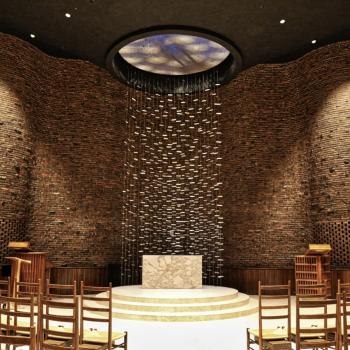Lectionary Resources
First Sunday of Advent
November 27, 2011
Mark 13:24-37
I can take nails across a blackboard, TV static, speaker feedback, and the elementary school string section's rendition of Beethoven's Fifth. I can block them out, at least for a while. What I can't take is high-pitched sirens or beeping sounds—like smoke detectors and seat belt beeping. I find high-pitched beeping sounds so annoying that I immediately get the ladder and the 9V batteries and head for the offending smoke detector. I find them so annoying that I immediately fasten my seatbelt even if I don't particularly feel like it just yet because I dislike the way the belt digs into my shoulder when I drive. I will take whatever action I need to silence the beeping. Smoke detectors and seat belt beeps are designed to be impossible to ignore because responding to them can mean the difference between life and death.
The same is true of the coming of the Son of Man on the Day of the Lord. Mark 13 is vague about the precise time, describing it as "In those days "(Mk. 13:24). In terms of the Hebrew Bible background, the reference is to the end time or to turbulent times. (Thurston, 149) The text makes mention of a "desolating sacrilege" (Mk. 13:14), probably a reference to the destruction of the Temple at Jerusalem, an event that threatened the focus of the religious life of Jews, not only in Jerusalem, but around the world. (Reid, 138) The text presents this event as one that precipitates the events of the end times, the sufferings that will befall Israel on the brink of the "Day of the Lord,"' toward which the prophets point. Such a day will include celestial portents such as a darkened sun and moon (Is. 13:10; Ezek. 32:7-8; Jl. 2:10), the arrival of a saving figure, and the gathering of the elect (Is. 43:1-7; Jl. 3:30-32).
Those signs will serve as a sort of Emergency Alert System, letting all the world know that they'd better run and hide or lift their faces to the sky to greet the Son of Man. Responding to the warning is a matter of life and death.
Speaking of Emergency Alert Systems, we have one in the U.S. It's our Nationwide Emergency Alert System, begun in 1951 during the Cold War era when President Harry Truman came up with Conelrad (Control of Electromagnetic Radiation System) to be able to warn U.S. citizens in case of a large-scale missile attack. In 1963, the Emergency Broadcast System replaced Conelrad, broadcasting alerts through local radio stations.
The current digital system went into effect in 1997. It's a great concept—a digital system that allows local emergency managers to easily activate and transmit an emergency alert. It works much of the time. The National Weather Service uses it. Amber alerts are broadcast via this system. If a tornado is coming or a child has been abducted, the warning concerns life and death.
But no system is perfect. On November 9, 2011 officials held a first-time nationwide test of our Emergency Alert System. Listeners and viewers on radio and TV stations across the country were supposed to hear the same high-pitched emergency alert tone for 30 seconds starting at 1 p.m., with an announcement that it was a test. A problem occurred with the test in Texas where I live. In some parts of the state, the audio announcement was inaudible, so residents didn't realize it was a test.("Gaps Found in Emergency System," by Tanya Eiserer, Dallas Morning News, November 10, 2011). In other areas the video that accompanied the warning was missing. It's not a very effective emergency alert system if you can't see or hear it.
According to Mark 13, there is nothing wrong with Jesus' emergency alert system. The breakdown comes when we respond to it in inappropriate ways. Reading between the lines, it seems as if Mark's congregation, in the aftermath of the destruction of the Temple, may have been facing three temptations. One was the temptation to follow false Messiahs (Mk. 13:21-22). Yet another may have been the temptation to watch for grand, dramatic signs of Christ's return (Mk. 13:24-27). And, while preoccupied with waiting for this drama, the temptation arose to be passive and inactive, un-invested in the present place and time.
Those who only wait for the end tend to withdraw rather than take up their cross and follow Jesus. (Reid, 138) Says commentator Robert Stephen Reid, "Mark's Jesus puts a 'pox' on those who try to calculate dates precisely because fixation on dates tends to obscure the task of living in the present with vigilance." (Reid, 138) "The one who stands firm (endures) to the end, rather than the one who calculates it, will be saved" (Mk. 13:13). (Reid, 139)





